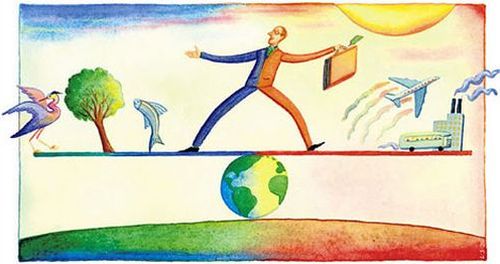A carbon offset is an emission reduction credit which can be purchased by individuals, businesses and governments to reduce their net GHG (greenhouse gas) emissions. Offsets are purchased from another organisation’s project that results in less carbon dioxide or other GHG in the atmosphere than would otherwise occur. Offsets are so named because they counteract or ‘offset’ a purchaser’s GHG emission. Effectively offsetting the emissions of an activity makes that activity ‘carbon neutral’.
Carbon offsets are becoming an increasingly popular way for individuals and businesses to participate in solutions to global warming. The basic idea of a carbon offset is to assess your personal contribution level to the global warming problem from such activities as driving, flying or home energy use. This contribution is called a carbon footprint. The term refers to carbon dioxide, the principal greenhouse gas (GHG). You can balance out your carbon footprint by buying carbon offsets which are typically measured in tons of carbon dioxide.
How do brands, businesses and people cancel out what seems like an unavoidable emission? Carbon neutrality begins with reduction – it’s a concentrated effort to produce less waste and use more renewable energy. After reduction has reached its limit or its comfortable threshold, carbon offsets can make up for the rest.
Carbon offsets are a form of trade. When you buy an offset, you fund projects that reduce GHG emissions. The projects might restore forests, update power plants and factories or increase the energy efficiency of buildings and transportation. Carbon offsets let you pay to reduce the global GHG total instead of making radical or important reductions of your own. GHG emissions mix quickly with the air and unlike other pollutants, spread around the entire planet. Because of this, it doesn’t really matter where GHG reductions take place if fewer emissions enter the atmosphere. Carbon offsets are voluntary. People and businesses buy them to reduce their carbon footprints or build up their green image.
Some environmentalists doubt the validity and effectiveness of carbon offsets. Because the commercial carbon trade is an emerging market, it is difficult to judge the quality of offset providers and projects. Trees don’t always live a full life, projects for the long-term containment of emissions sometimes fail and customers might sometimes be deceived by offset companies. Voluntary offsets can easily become an excuse to over-indulge and not feel guilty about it. Carbon offsets do, however, raise awareness about lowering the GHG world total. By funding reductions to GHG emissions you balance out, or offset, your own impact by an equivalent amount. Carbon offsets help you take personal responsibility for the environmental consequence of your activities.

